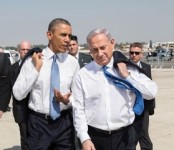
A ceasefire to halt the carnage in a bloody civil war should be a welcome event. But this is not likely in Syria. Two of the most vicious combatants, Daesh and Jabhat al Nusra (an affiliate of al Qaeda) are not even party to it, and Russia has forewarned that it will react with force to any violations by the rebels who seek to oust Syrian President Bashar Assad. And after President Putin sent in his airborne ‘cavalry’ to save Assad by bombing just about anything that moved, the Syrian tyrant is firmly in place in his presidential palace in Damascus.
For his part, U.S. President Barack Obama has again said Assad must go but who is listening? Back when it might have been possible to topple the brutal Assad regime, Obama warned there would be ‘serious consequences’ if the Syrian President dared to use chemical weapons on his own people. With the rebels moving steadily on Damascus, Assad called Obama’s bluff. But Obama backed down and ran to Putin to help get him off the hook. After sizing up the situation, Putin played his cards right and today we see the results. Realizing that Obama will pay just about any price to avoid any serious involvement in the Middle East, Putin has moved in to dictate the current outcome.
This is the outcome – Obama was ready to watch the slaughter of some 500,000 people, hundreds of thousands more injured, and a whopping 10 million Syrian refugees banging on the gates of Europe and neighboring Arab states. President Obama says he is not under any illusions, and there are plenty of reasons for skepticism. But then he relieved himself of any responsibility as leader of the Free World and defended his policy in Syria, and it sounded as if he was simply going through the motions:
‘But history would judge us harshly if we did not do our part in at least trying to end this terrible conflict with diplomacy’.
The Iranian connection…
It’s not as if the Obama administration was flying blind over Syria. Bear in mind, Obama’s main foreign policy goal for his second term was forging the nuclear weapons deal with Iran. But if Tehran was backing Assad to the hilt, it made sense that the U.S. would avoid any clash with the Iranians over Syria that could jeopardize said nuclear accord. Pure and simple, Washington did not perceive the outcome of the Syrian civil war as a vital strategic interest – the nuclear agreement took top priority.
How do Israeli decision makers view ceasefire prospects?
Israel’s Defense Minister, Moshe Yaalon, believes it will never get off the ground. In his view, if it does not include Daesh and al Nusra, it will be unstable. Moreover, the situation on the ground is chaotic. It can also be said that Russia and Iran will use any let-up in the fighting to bolster the Alawite regime. It will also deal a blow to the morale of the Free Syrian Army, which has received only half-hearted support from the U.S. while it has been clobbered by the Russian air strikes. Meanwhile, the Assad regime gets a real shot in the arm. No wonder Assad was all smiles when he declared facetiously that his decimated army would honor the ceasefire.
Yaalon also sees Syria as being an arena of confrontation between the ‘Great Powers’. It has evolved into a ‘war of cultures’ with chaos spreading from Syria to some other Middle East states. At a meeting with the Defense Minister of Cyprus, Yaalon declared that Israel was ready to cooperate with other states in the region, with which it does not have formal relations, with the goal of stabilizing the area. This was yet another indication that Israel and other countries feel they must depend more on themselves and less on the U.S. these days.
Naturally the IDF will maintain its alert along the Golan Heights and be prepared for any eventuality. This will exclude any involvement inside Syria – except for the policy of interdicting the shipment of game-changing missiles to Hezbollah in southern Lebanon. Any cross-border shooting into Israel will continue to be met with a stiff reaction. But the break-up of Syria as a viable functioning state leaves many unanswered questions. Obviously it is a plus for the Jewish state if all its bitter enemies such as Daesh, al Nusra, Iran’s Revolutionary Guards, and Hezbollah keep clobbering each other.
Then there are the Golan Heights. Rising to a height of over 1,000 meters, the plateau dominates the towns and villages of Israel in the valley below. It runs for 62 kilometers along the border. Before it was stormed and captured by the IDF in the Six Day War of 1967, Syrian gunners fired at will on the Israeli communities down below in the Galilee. Since then, former Prime Minister Yitzhak Rabin and even Bibi Netanyahu conducted indirect contact with President Hafez Assad on a peace deal that would include a return of much, if not all, of the Golan Heights to Syria. The international mantra in those days was ‘territory for peace’. Today amid the blood bath in Syria, one can only be grateful that Israel did not withdraw from the Golan, which could have now fallen into the hands of Daesh or the Iranian forces now fighting in Syria.
Loud wake-up calls for Netanyahu…
Prime Minister Netanyahu should heed two loud wake-up calls given this week. One came from London and the other from the IDF intelligence chief Gen. Herzl Halevi. British Prime David Cameron is a tried and trusted friend of the Jewish state. Cameron has seen to it that Britain has just passed a law barring the boycott of Israeli products in the UK. But a few days later Cameron also blasted Israel’s building and control over East Jerusalem. At question time in the House of Commons, Cameron said what he had witnessed in East Jerusalem was ‘genuinely shocking’.
While first acknowledging that Cameron was indeed a friend, Netanyahu quipped that Cameron was lacking some ‘basic facts’. First, if not for Israel, Daesh and Hamas would have already destroyed the holy sites (certainly the Christian and Jewish). And he added:
‘Only Israeli sovereignty ensures that Arab residents of the city have roads, clinics, jobs and all the other means of normal life that their brothers do not enjoy throughout the Middle East’.
But the fact remains, if someone like David Cameron is taking issue with Israel, Netanyahu should give it some thought about what his statecraft is on the international front.
The second call came from the IDF. The commander of the IDF Intelligence Branch, Maj. Gen. Herzl Halevi presented his somber estimate of what is transpiring in Judea and Samaria amidst the current wave of ‘lone wolf’ stabbing attacks by mainly young Palestinians, many of them juveniles. While concurring with the government’s assessment that the violence was encouraged by incitement in the official Palestinian media, the intelligence chief said Palestinian President Mahmoud Abbas has ordered his security forces to prevent the terror attacks when possible. But Halevi was also quoted as saying that these young Palestinians were acting out of a sense of frustration, and that ‘they had nothing to lose’ because of the stagnation in the peace progress and lack of movement toward a Palestinian state. The General did not make any recommendations when he addressed the cabinet – that was not his prerogative. But obviously he called it as he saw it.
Also appearing before the Knesset Foreign Affairs and Defense Committee, Halevi was said to have warned of the deteriorating economy in the Gaza Strip that is controlled by Hamas. Other senior IDF officers have also pointed to the economic distress that could trigger a new Hamas offensive. Since the massive rocketing of Israel triggered a mini-war in the summer of 2014, Hamas has acted to suppress isolated attacks by other terror organizations in Gaza. However, the danger is that the sagging standard of living could lead to an explosion; this in spite of the fact that Hamas is aware that it is no match for the IDF.
In light of this, the idea of building a seaport in Gaza could supply jobs for many unemployed Gazans and a major boost for the economy. This is an old idea that was never implemented because of the danger that Hamas would try and smuggle in more missiles and weaponry to attack Israel. However, in the current context, Turkey has suggested that it would be partner to such a venture and participate in a reliable inspection regime. Moreover, some Israeli experts believe it would be possible to design a fail-proof inspection regime. At present, Netanyahu and Yaalon are reportedly unconvinced.
In fact, Hamas is suspected of diverting large quantities of cement transported via Israel, for building underground attack tunnels into Israel. Netanyahu has hinted that Israel is well on the way to implementing a unique high-tech system for detecting and collapsing the tunnels that have been worrying Israeli civilians living along the border with Gaza. (By the way, Cairo, which views Hamas as an ally of the radical Muslim Brotherhood inside Egypt, imposes a stiffer blockade of Gaza than does Israel.)
Netanyahu, Reform Jews & Palestinian poker game…
The bottom line is that it may be the Palestinians have not given up their plan to wipe out Israel by hook or by crook. In fact, there is precious little evidence that they are truly ready to live in peace with a Jewish state, as have Egypt and Jordan. Nonetheless, Netanyahu holds nearly all the cards, so he should and must deal first. This is what people such as David Cameron and many Israelis think. To sit and do nothing invites more pressure from the BDS guys; some who are outright anti-Semites while others are not.
But it is argued that Netanyahu would risk his PM’s seat if he offers the Palestinians a fair peace offer which they will only refuse as they did with Yitzhak Rabin, Ehud Barak and Ehud Olmert. It is a fact that both Yasser Arafat and Mahmoud Abbas responded by waves of terrorism or simply demanding more and more. But this week, Netanyahu may have risked his coalition by taking on the ultra-orthodox parties and not opposing the move to grant Reform and Conservative Jews a place to pray at the Western Wall (site of the First & Second Jewish Temples). So far, Netanyahu should be commended for doing the right thing. The time has come for Israel’s leader to also start dealing in the Palestinian poker game.
Trump beats the drum for Israel…
Donald Trump has wrapped up more victories in the Republican presidential primaries, so where does he stand on Israel? In Las Vegas, reporter Boris Bismuth of the Israel Today freebie got an exclusive:
First on Trump’s commitment to Israel:
‘I’d try to reach a peace agreement between Israel and the Palestinians, but the Palestinians must also be interested. If the other side doesn’t really want to talk to you it’s a little tough to reach an agreement. Don’t be mistaken in Israel. I’m your biggest friend today. My daughter is married to a Jew who is an enthusiastic supporter of Israel, and I participated in marches for Israel, my friendship for you is the strongest of all the candidates’.
As for the Iranian nuclear agreement:
‘This was the worst deal Israel could have received. Beyond the agreement, Iran also gets $150 billion. To think that we signed the accord without even talking to Israel! In my view this is the worst thing that has happened to Israel. It even includes a clause that commits to defending Iran’s nuclear facilities if they’re attacked – you have to read it to believe it. I don’t know what that means – that America will attack Israel if Israel attacks Iran? It’s ridiculous’.
And how does Trump himself see his phenomenal popularity that has astounded the pundits?
‘The pundits failed to sense the huge anger that exists in America. No one foresaw the rage of the American people toward the administration, against the bad agreements the U.S. signed, like the trade agreement and the nuclear deal with Iran. What do you think? That the American people liked the deal? The Iranian agreement is one of the causes for the great anger that exists today in the U.S. It was a terrible mistake.
Look at the administration’s treatment of our military – we are no longer winning wars and America must always win. It’s important for America and for the world. President Obama was not good. He was the worst president in history for Israel. Look at how Prime Minister Netanyahu was so frustrated during all his visits to Washington. All Netanyahu’s claims are right – he’s 100% right. Is that the way to treat friends – I’ll change all that’.
Reporter Boaz Bismuth concluded by asking Trump if he was indeed speaking to the next president of the U.S.
‘It’s still a long way to go but we’re on the right course. If I reach the White House you’ll have a true friend there and not just from today’.




